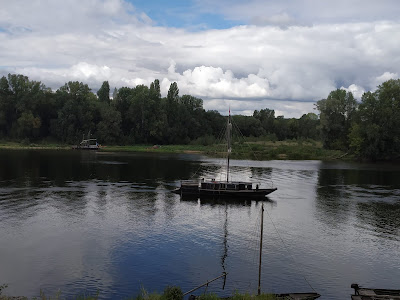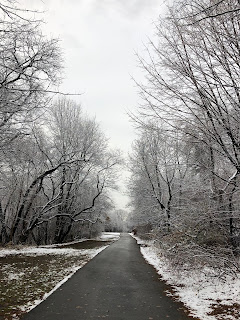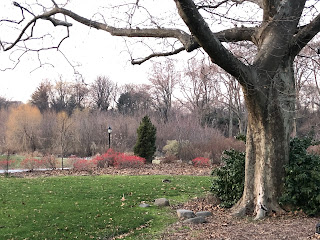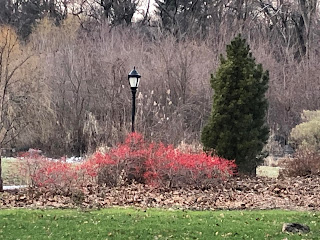I'm Now a Covid Refugee from Brooklyn
By Norma Hopcraft
I went back to Brooklyn from July 10 to 17, to linger over it, romance it, appreciate the good, take note of the bad so I could leave with less pain—and then to leave it all behind. My life as a Brooklyn writer closed on Friday, July 17, when I hopped into U-Haul’s biggest truck, jammed full of my studio apartment’s contents. I drove that monster 400 miles to Rochester, New York.
My inventory included:
- 1 box of filled-up, written-in journals
- 1 box of blank journals (I can't stop buying them)
- 2 boxes of quilt bits to be pieced together
I had arrived in Brooklyn on July 10 and enjoyed my apartment organized for two days—my cozy nook, my little abode, my bit of peace in the tumultuous, tossing sea of people in New York City. While I lived there, it was usually quiet—except when the neighbor left her dog unattended and it cried for hours at a time. Except when there were occasional arguments across the courtyard or out in the street. I always prayed, "Please, no violence."
There were gunshots the first day I lived here, in 2017, and again this past Christmas. Other than that, this apartment was a refuge from the sea of strangers I passed through every time I went out the door.
The nightmare of moving
On Monday morning, July 13, I took pictures of my sweet space whole and complete, and then I did my least favorite thing in the world: I tore my home apart to pack.
It's not something I had decided upon lightly. I had fled to Rochester, NY as a Brooklyn Covid refugee on March 14. Four months, one-third of a year, went by. From the moment I arrived in Rochester, I began wondering if I would ever live in Brooklyn again. I started to question moving full-time to Rochester.
It took until Thursday, July 9, for me to come to a decision to move. It’s risky. My employer may require me back in the office at some point. When will that be? When a vaccine is developed, and that will take an unknown amount of time. Another risk: I’m on the hook to pay the Brooklyn rent until a new tenant takes over. When will that be?
If you know of someone interested in living in Prospect Park South—10-minute walk to the park, 3-minute walk to the Church Avenue B & Q station, 35-minute train ride to Mid-town Manhattan—and who would qualify financially with the landlord, please leave a comment below!
What a studio in Brooklyn looks like
My studio apartment in Brooklyn has been a great space—in a pre-war building, which means parquet floors, high ceilings, gracious proportions to the rooms. But I felt disappointed in my life there: I had survived living in Brooklyn but I had not thrived: I hadn't been as creative in this studio as I had been in my studio apartment in Paris, where I wrote and revised great chunks of The Paris Writers Circle. Here are some pics:
Eat-in kitchen, with a window, no less! Not common in NYC!
Plenty of cabinets and counter space -- also rare in NYC!
Here's where I lived. My grandmother's marble-topped chest of drawers, on the right, held lots of quilting supplies and journals. My work table is where I tried to sit and write, but usually I felt too restless, too compelled to get out. My dressing room (kidding).
My work space. Note the parquet floor.
Being a writer in Brooklyn
Here in Brooklyn, I had found it hard to be alone in the apartment and write. I always felt restless, like the tumultuous crowds of people in the city. During the week it was difficult to concentrate on writing before facing the commute on a crowded Q train. On Saturday mornings, I couldn’t stand to sit alone at my worktable and write. I felt I had to get out and see what was going on. The lively streets have a strong allure.
To be able to write, on Saturdays in good weather I would walk a mile to my favorite bench in Prospect Park. When it was too cold, I’d walk half a mile to a café to write among people and steel myself to not buy a muffin or a scone. Or I’d walk two miles to the Brooklyn Central Library to work among people in a huge room with 18 long worktables.
Since Covid shut things down, I couldn’t sit in the library or café. And my favorite bench in Prospect Park is inaccessible now due to refurbishment of the Oriental Pavilion (see my post on this decaying architectural delight HERE. I nicknamed it the Sparrow Hotel for all the nests in its derelict eaves.)
My favorite bench to sit and write is entangled in the refurbishment of the Oriental Pavilion.
Covid forced me to move out
In the midst of Covid, in March, I was grateful to have somewhere to escape to. If I had stayed in Brooklyn during Covid, I would have lost my mind. The isolation, the confinement within a small space, the sound of sirens day and night, would have sunk me. I thank my Higher Power for providing an escape—the Rochester home of my daughter and beloved son-in-law and 2-1/2-year-old grandson. We’ve had a pleasant few months.
When I went back to my Brooklyn neighborhood on July 10, I was immediately struck by one of its strengths: diversity. I saw a Latina girl swing her long black hair, a Pakistani man dressed in a white shalwar khameez, the pajama-like pants and tunic, walking near her, and black and white neighbors: young, old, and in between. It’s a beautiful aspect of this neighborhood.
I spent a lot of time in Prospect Park the first two days of my July stay. I visited the lake and made this little video of my favorite thing: water reflecting on the underside of leaves.
Turn your volume way up to hear my commentary.
On Monday the brutal packing work began.
As I packed, I found things of my mother’s, father’s, grandmother’s that I had put in a drawer and forgotten about. I missed these departed loved ones intensely. I tenderly wrapped a little nut dish my grandmother left to the family. It's cut glass, and its sharp little edges prickled my fingers. She loved cut glass and bought it as an investment. My family sold off all the big pieces when my mother died. I just have this one little dish, and I like to put it in a window where the sun will shine on it.
Nostalgia for the life I was leaving
As I packed, I felt nostalgia for my Brooklyn life: ballroom dancing on Friday nights; Soho Shakespeare rehearsals (check them out, they have free acting classes online), where I did research for my next novel; waiting on the Church Avenue Metro platform for the Q train; lavender lattes at nearby Café Madeline; filming the profusion of buses and trucks on Church Avenue for my grandson; occasional trips on the Q to Coney Island (pics HERE); walks in Prospect Park; worshipping at my beloved church, St. Paul’s Episcopal, where I was the only white face and was welcomed warmly by everyone while I was fully aware that if these black parishioners showed up alone in a white church, they might not receive as beautiful a welcome—it was true Christianity in action and I’ll never forget it.
During my recent week in Brooklyn, I checked up on Mr. Kosher. Stories about him HERE. He made it through a Brooklyn winter, day and night, never going indoors, foiling all my anonymous attempts to find him help. Now he’s camped under a huge golf umbrella in Prospect Park, in Drummer’s Grove. He was shirtless the day I saw him. I talked with my pastor, the rector of St. Paul’s, who said he talks with Mr. Kosher too. Mr. Kosher offered him a debit card to pick up smoked turkey thighs for him. That experience turned my pastor into a smoked turkey thigh fan himself. Mr. Kosher may have his debit card funded by his son, who lives far away in the Bronx, or perhaps by his Jewish temple, I don’t know.
Mr. Kosher (his real name is Hosea, like the prophet) is back to camping
within Prospect Park, instead of spending the winter outside the Prospect Park
B&Q Station.
I was happy to sense a new optimism in the air in my neighborhood, Prospect Park South, which is the developers' new name for the north end of Flatbush. It's full of pre-war brick apartment buildings in which so many people live who, when I escaped in March, seemed to have no hope of prosperity, no chance at economic equity with someone like me. I’d sensed despair, hopelessness. People were always anxious, not knowing if they could make rent that month. It saddened me. So many people in my neighborhood could not afford healthcare. There was a marked prevalence of people limping, of people using canes, of people missing teeth. Many people looked angry. They were trapped in a racist system and had given up hope for a better future for themselves and their children.
Hoping to make a difference
I tried to help by getting involved in circlesofsupport.org, an organization that helps people coming out of incarceration and that meets at St. Paul’s. I helped a group through one cycle. Then Covid came, activity was postponed, and I had the lucky option that others didn’t have, of fleeing a Covid hotbed.
When I returned to Prospect Park South in July, however, I felt a new, positive energy in the air. Now that both white folks and black are demonstrating on behalf of racial equity, people are hopeful of change. Now they feel they are being listened to by politicians who are in a position to legislate a more level playing field. They are not looking for a hand-out, they are just looking for a chance. I felt the new hopefulness. I wanted to stay and be a part of it.
These characters in my neighborhood! The lovely people in my church! The stateliness of the trees in Prospect Park! This new hopefulness in the air! All the caché that saying “I live and write in Brooklyn” conveys! How could I not live here forever?
But how could I not live near my grandson? And the baby that's expected in October?
I called a friend and told her how torn I was about leaving Brooklyn.
“You were a lost, lonely soul in New York,” she declared firmly. “I could hear it in your voice. You’re much better off in Rochester with your family.”
So on July 17, I said goodbye to my 4-1/2 years of Brooklyn life. Those years went FAST. I lived in three neighborhoods in Brooklyn: Bedford-Stuyvesant (for one month), Sunset Park (for one year) and Prospect Park South for 3-1/2 years. I tried to milk my Brooklyn experience for everything I could get out of it for my writing: the feel of various neighborhoods, pictures of row houses and brownstones, lots of scenes in every season from Prospect Park, one of the great parks of the world.
I'll miss Brooklyn.
But I was very lonely there – every face was that of a stranger. The people around me were stressed by being among too many people, and I was stressed to be thrown shoulder to shoulder with so many strangers. As my friend Cecilia says, "New York is a special place with lots of advantages, but emotional support is not one of them."
Toward the end of my Brooklyn life, in February and March as news of Covid was increasing, I felt so alone. I was calling my daughter once or twice a day, calling friends, and then not feeling any better. It was unsustainable. By mid-March the sirens, which could be heard day and night even in regular times, were now sounding continuously, day and night. I was frightened, I felt so alone. I knew I couldn’t survive working alone from home, day after day, in a studio apartment, in the middle of a pandemic, surrounded by strangers. What if I got sick? Who would even know? Maybe the paramedics would be too busy to come and help me.
Starting over
On March 14, I fled to Rochester and family.
I went back to Brooklyn in July, and by July 17, I was packed. That morning I got up early and dressed up a bit—makeup, earrings, a cute top, new slacks, ballet flats—I believe in looking my best when I travel so that, if I need help, people will be more inclined to help me—and climbed way up into the U-Haul, packed with the things I’ll need to create a place of my own in Rochester.
I turned the key. The engine roared. This beast was huge, taking up almost all of a lane. The rear-view mirrors stuck out even farther. I drove, scared out of my wits, through the narrow, car-clogged streets of Brooklyn to the Verrazano Bridge, across Staten Island, across the Goethels Bridge to New Jersey, across that state in rush-hour traffic to the Poconos, then with growing confidence through vast open spaces in Pennsylvania and New York State.
I arrived in Rochester safely. My belongings are now in my daughter’s garage and attic.
And I’m left wondering: where’s my home? Now that I’m in a city of 750,000 people, compared to NYC and its 8.4 million and its 23 million in the New York metro area, with all the arts opportunities it incubates, can I still grow as an artist?
I'll be journaling on that topic, and piecing together a new quilt of my life.
What will I do with my one wild and precious life?
How about you? Have you said goodbye to a special space, a special place, special people, because of Covid? What will you do in your new place with your one wild and precious life?























